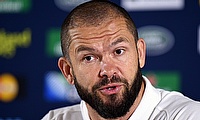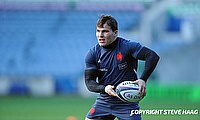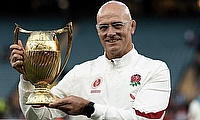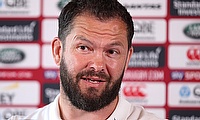Six Nations coaches understand the current pressures on players - We need to do the same
Over the last 10 months, I have been fortunate enough to work alongside the charity Looseheadz.
For those who don’t know, Looseheadz focus on raising awareness for mental health and they use rugby union as a platform to do so. Mark Shotton, his son Rob, and Dave Nicoll are the three men behind the charity and they continue to do tremendous work despite all the challenges Covid-19 has thrown their way.
Last April, they asked TRU to help them launch a podcast and since then, we have spoken to some of the biggest names in the sport about their glittering careers.
Don’t get me wrong, it has been a privilege to listen to Ugo Monye reminisce about the 2009 Lions Tour and Shaun Edwards discuss the art of defence, but speaking to these high-profile figures about the importance of psychological wellbeing has resonated with me much more.
Why?
Looseheadz uses the tagline ‘Tackle the Stigma’. This might be a narrow-minded view of things, but since working alongside the charity, I have noticed more and more people, not just in rugby, talking about their mental health which can only be a positive thing.
Last week, one of Looseheadz’s ambassadors, Denny Solomona, posted a message on Instagram to explain how difficult the last couple of seasons have been for the Sale Sharks winger.
The response? Overwhelming supportive: “Big statement from a big man” was one comment. “Hopefully the openness you have shown will inspire others to find help if they need it” was another.
When we finish a podcast, Mark, Rob and Dave usually say: “It is easy to forget these guys are just genuine people” and that is something we need to remember with one of the highlights of the rugby calendar nearly upon us.
It seems fair to suggest that the last 12 months have placed more physical and mental demands on players than they have ever experienced before.
Wall-to-wall rugby means fixtures are being packed into a shorter space of time, so the bigger picture surrounding the mental state of players might be easy to forget when we are tuning in to this year’s Guinness Six Nations.
However, what was refreshing to hear during last week’s virtual tournament launch was some of the game's leading coaches accepting players’ decisions to step away from the high-pressure environment if they choose to do so.
Firstly, Joe Marler’s choice to pull out of the championships due to “personal reasons” was supported by England boss Eddie Jones. It is reported Marler’s wife, Daisy, is expecting their fourth child so to prioritise his family over the extra emotional expectation of a Six Nations campaign is something the 30-year-old was willing to do.
“Joe has made a decision that we 100 per cent support,” Jones said. “When he decides to make himself available again, we will have a look at selection and that’s how we look at it – 100 per cent. No ifs or buts, it’s as clear as day.
“There will be some time in the future when he’s ready to come back and will get selected. We’ll take that when it comes. Joe has been an outstanding player during my time with England.”
Jones and England have now entered a bubble for eight weeks, and this close-natured environment can have an impact on top-level athletes.
In the Italian camp, head coach Franco Smith will be without Matteo Minozzi. The Wasps full-back took to social media to explain his reasons for missing the Six Nations: "The last year has changed many things, changing the country and a few months after having to experience the UK lockdown away from everyone has been a great and difficult challenge.
“I'm physically and mentally tired, a bit too much to live another two months in a bubble. I hope even if you can't support it, you'll understand my choice.”
Smith was quick to show his full support of Minozzi’s situation: “I can 100 per cent understand it. Having lived in a bubble myself, it is challenging. The fact that you don’t see your partner or your kids in the evening makes a difference.
“I think some guys have the personality to be very social, so to ask them to stay in their bubble is challenging. To focus only on rugby for two months and eat, sleep and drink it, it is tough.
“Player welfare for me is very important. We all talk about it. We talk about concussion. We talk about playing with injuries, but that emotional and mental diligence is important.
“I think all the teams will encounter this. They will have somebody who is suffering more than they will acknowledge, maybe, and from our side as coaches and mentors, we need to raise that to do the best we can to develop it through the help of professional people. We want to create an environment where we can still take into consideration that some of these guys adapt differently.”
The mental fortitude which a Six Nations campaign brings is something which these top athletes have to deal with. When you tie that in with the worries and stresses presented by the global pandemic, it is easy to see why some players' resilience might be eroding.
The Six Nations kicks off this weekend and arguably the standout fixture on matchday one is Scotland’s clash with England at Twickenham.
The 'auld enemies' will do battle on Saturday afternoon, 150 years on from their first encounter. While Gregor Townsend and skipper Stuart Hogg are relishing the occasion of “doing their nation proud”, the Scotland head coach also highlighted the importance of the wellbeing of his players.
“We are well aware that different players find it tough during this period with all that is going on in society,” Townsend said. “Different people have different challenges all of the time. We have to make sure we support those players and we need to be aware if anybody is under any challenges.
“We made wellbeing a huge priority back in autumn, and even more so now, so we are hopeful that players will come forward if they are struggling at all and hopefully, we can find solutions to help them through this period. Players will have the freedom to go home if that is what they want to do or if they want to stay around this supportive environment we have here, then there will be solutions if anyone is struggling.”
With the Six Nations just days away, players will be pushing themselves to the limit, both physically and mentally, in the pursuit of glory.
Of course, we all want to see high-quality contests and if someone misses a tackle or if a player fumbles the ball over the try-line, we can be frustrated and analyse the error, but let’s also remind ourselves that the pressures which these athletes are putting themselves through, both inside and outside of rugby, are enormous.
Listening to Jones, Smith and Townsend, they clearly realise the importance of making player welfare a priority and we as supporters and keen onlookers need to also bear this in mind during an unprecedented Six Nations campaign.
Visit looseheadz.co.uk to find out more about their work. Click here








